Juul exposed: How Big Vape took a page from Big Tobacco’s old ad playbook
This post has been updated.
E-cigarette maker Juul Labs has been a roaring success in recent years, becoming the fastest startup to reach a valuation of over $10 billion.
But the company has been accused of targeting minors in marketing campaigns eerily similar to Big Tobacco in its heyday and is facing increasing scrutiny from authorities.
‘He looked down and smiled, which I thought was very telling’
Research shows that Juul’s early campaigns heavily borrowed from tactics used by old cigarette companies — suggesting that even if the smoking device has changed, the pitch remains the same.
In January, a team at Stanford recently published a report that found that Juul’s “principal advertising themes … are closely aligned with that of traditional tobacco advertising.”
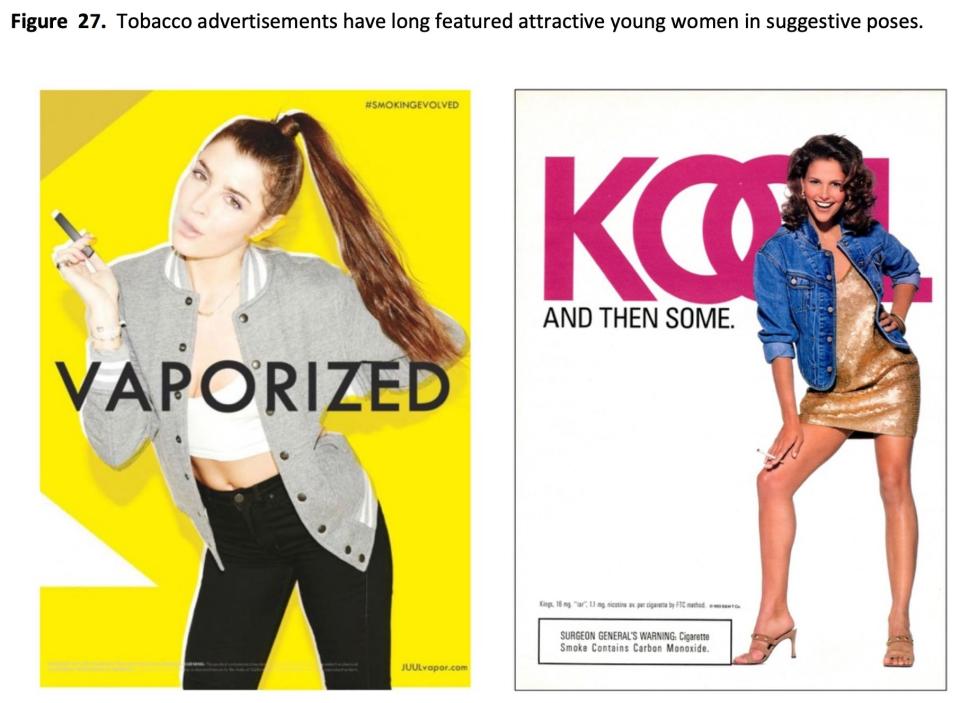
Researchers highlighted themes like “pleasure/relaxation, socialization/romance, flavors, cost savings and discounts, holidays/seasons, style/identity, and satisfaction” were being recycled by e-cigarette companies like JUUL in various advertisements.
This was a conscious decision by Juul co-founder James Monsees, they wrote, arguing that Stanford’s extensive database of around 50,000 old cigarette ads had been “quite useful” to the Juul team in creating the design of its ads.
Dr. Robert Jackler, the lead author of the report, told Yahoo Finance that when he had visited the company’s headquarters in mid-2018, he had brought the uncanny similarities up to Monsees.
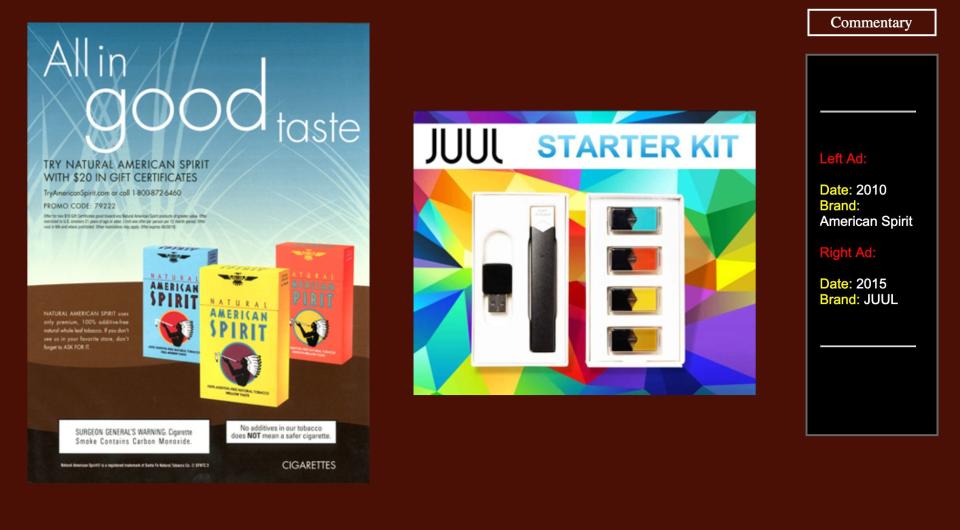
“I said to him, … ‘Your Vaporized advertising had the same color schemes as American Spirit’,” Dr. Jackler recalled telling him, referring to the company’s ‘Vaporized’ campaign. “[It] looks like you ripped that off.”
To that, Monsees “just didn’t say yes or no,” said Dr. Jackler. “He looked down and smiled, which I thought was very telling.”
A Juul Labs spokesperson disagreed with this characterization, stating: “Dr. Jackler's characterization of his interaction with James Monsees is flat out wrong and JUUL has never modeled our marketing campaigns off of tobacco companies' advertising."
In a previous statement, Juul told Yahoo Finance: "We fully recognize that some of our earliest marketing initiatives did not fully reflect the mission of our company, which is to improve the lives of the world’s one billion adult smokers, with the eventual goal of eliminating combustible cigarettes.”

‘Troubling popularity of products like Juul among kids’
Since the launch of its e-cigarette in 2015, Juul has taken nearly 75% of the U.S. e-cigarette market and triggered a “nicotine arms race” at the expense of traditional tobacco companies.
Big Tobacco began pouring money into upstart vaping companies, eager to get a slice of the pie as their market share erodes while lawsuits increase and e-cigarette usage grows.

In December 2018, Altria (MO) announced that it would purchase a 35% stake in Juul for $12.8 billion — which valued the San Francisco-based company at $38 billion — in a sign that e-cigarettes are seen as a new cash cow for Big Tobacco.
And like combustible tobacco, e-cigarette usage brings nicotine addiction and health risks. Recent research by the American College of Cardiology found that e-cigarette users were 30% more likely to experience a stroke and 56% more likely to have a heart attack than nonusers. The study also found increased coronary artery disease and circulatory problems, including blood clots, as well as increased risk of depression, anxiety, and other emotional problems.
"Until now, little has been known about cardiovascular events relative to e-cigarette use,” said Dr. Mohinder Vindhyal, the study’s lead author, who is assistant professor at the University of Kansas School of Medicine Wichita. “These data are a real wake-up call and should prompt more action and awareness about the dangers of e-cigarettes.”
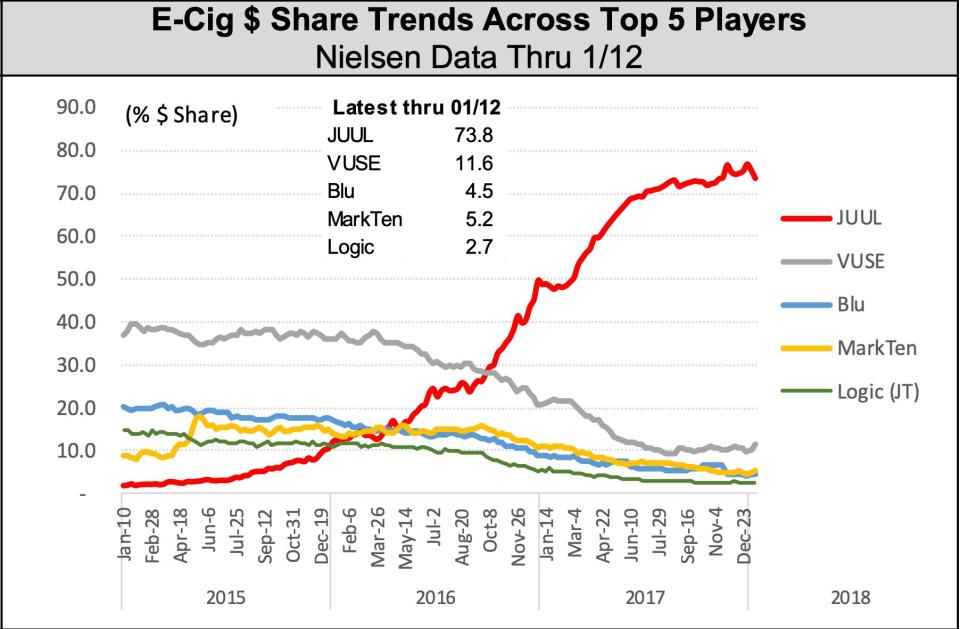
‘Troubling popularity of products like Juul among kids’
Former FDA Commissioner Scott Gottlieb, who left the agency in April, detailed how tobacco giant and major Juul-backer Altria contradicted an earlier decision to withdraw pod-based products from the market.
“It concerned me that a company that affirmed what we believe — which is that the pod-based flavored products are driving youth use — went so far as to take the product off the market and publicly make that statement, … then made a substantial investment that also guaranteed that they’re going to expand the market share of the leading pod-based flavored products that’d been used by children,” Gottlieb explained at a Brookings Institution event.
He went on to say that “you’re going to be at overall tobacco use among children in this country, of 40, 45%. That is simply intolerable. I went back and looked at data back to 1950, and we haven’t seen that level of tobacco use among kids.”

As of April 2018, the journal JAMA Pediatrics published a study stating that about 45% of the public accounts following Juul’s Twitter account were 13 to 17 years old and only 19% of Juul’s followers were at least 21. (The tobacco sale age is 21 in 14 U.S. states and at least 470 localities.)
The rising popularity among youths also caught the attention of the Centers for Disease Control and Prevention (CDC), which feared that the companies making them were becoming increasingly and single-handedly responsible for causing a steep resurgence in tobacco use among minors.
“About 4.9 million middle and high school students were current users (used in the past 30 days) of some type of tobacco product in 2018, up from 3.6 million in 2017,” a February CDC report noted. “This increase — driven by a surge in e-cigarette use — erased past progress in reducing youth tobacco product use.”
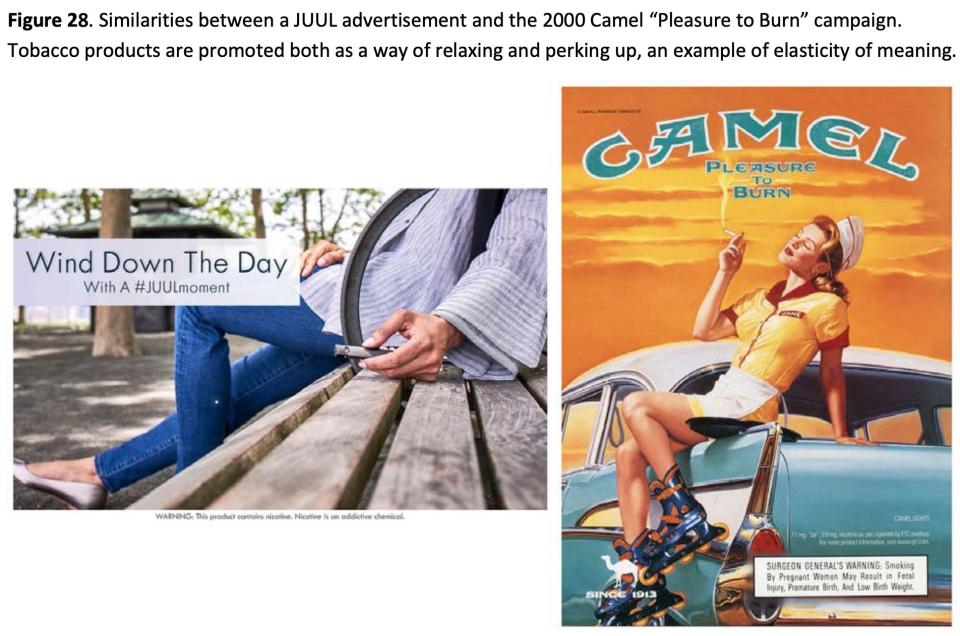
State governments are now starting to take action.
“Just when teen cigarette use has hit a record low, ‘Juuling’ and vaping have become an epidemic in our schools with products that seem targeted to get young people hooked on nicotine,” Massachusetts Attorney General Maura Healey said in July 2018 while announcing an investigation into the company and other online e-cigarette retailers over marketing tactics and sales to minors.

On May 15, North Carolina Attorney General Josh Stein announced the first lawsuit against Juul by a state, alleging that the company “targeted young people” and “downplayed the risks.”
"As a result of Juul's deceptive and unfair practices, thousands of North Carolina kids are at risk of addiction to nicotine," Stein said. "Juul must be stopped from spreading this disease any further and must pay for its violations of the law.”
Different generation, same game: Juul and Big Tobacco
To fully understand the magnetic pull of today’s influencer marketing, it’s useful to look at how Big Tobacco — notorious for preying on minors — sold cigarettes.
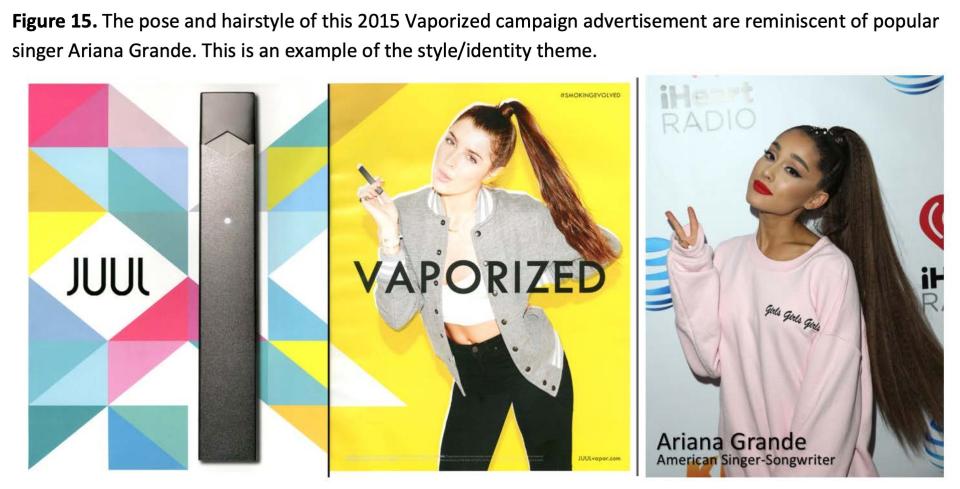
In 1998, the Washington Post reported that internal documents seized from R.J. Reynolds Tobacco — at that time the country’s second-largest cigarette company — revealed that it had for decades developed “aggressive marketing proposals to reach adolescents as young as 14 years old.”
One of the company’s vice presidents had specifically told the Reynolds board in 1974 that a forthcoming decline in the business necessitated the refocus on young people: "They represent tomorrow's cigarette business … as this 14-24 age group matures, they will account for a key share of the total cigarette volume for at least the next 25 years."
Other companies followed a similar tactic.
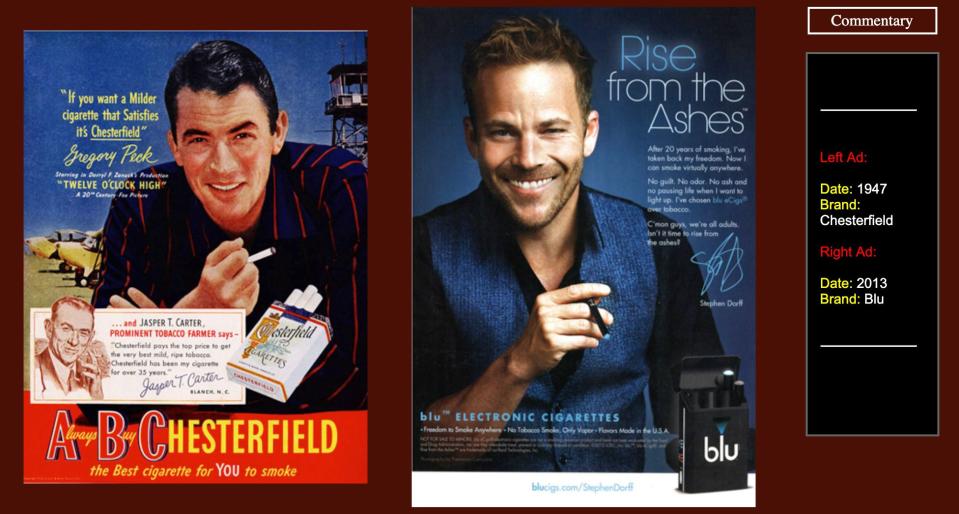
“When you look at cigarette promotion over history, a lot of it has to do with social connection with a group of people,” Elizabeth Crisp Crawford, an associate professor of communication and advertising at North Dakota State University, told Yahoo Finance. “A lot of it has to do with how can I connect with other college students, is the cigarette — the traditional kind of course — being used as a way to initiate a friendship. So if you see someone and you want to talk to them, you can offer to light their cigarette.”
Crawford, who wrote a book on the topic, added: “Even my grandfather claims that when he was in high school, there were cigarette representatives around his high school — and this would have been in the 40s — that would hand out packs of free cigarettes out to high school students.”
Crawford detailed the trend of tobacco companies targeting student groups, often even pushing for a grassroots marketing arm on campus that would promote smoking.
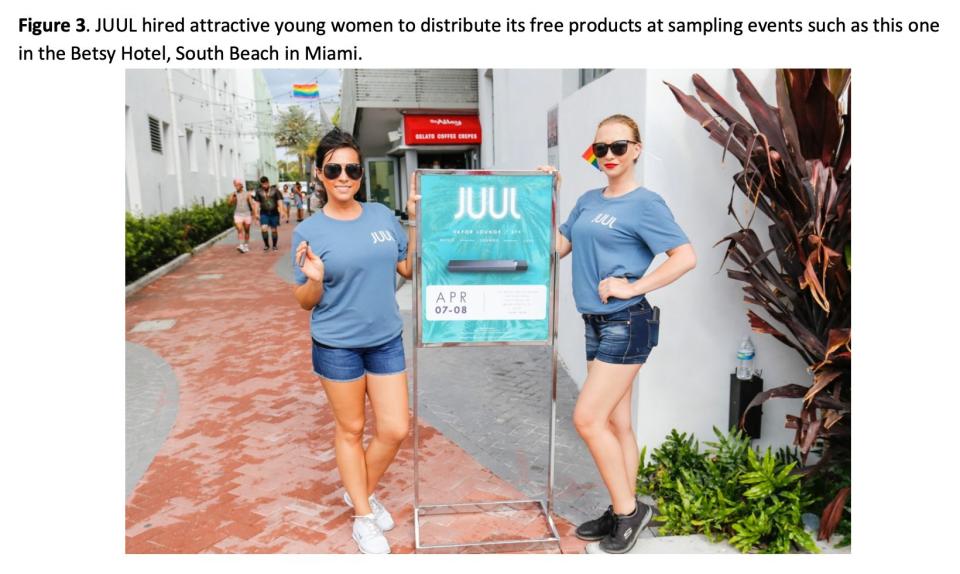
And since it’s just students talking to other students, “that's very effective because that interpersonal interaction is really what gets people,” Crawford said. “You see that same thing with this influencer marketing and social media. So to me, it's the same thing that has been done throughout history, but just this time is virtual instead of in person, if that makes sense.”
Adapting to the modern age, Dr. Jackler said, Juul pushed the boundaries of modern advertising to reach an even wider audience with the social media platform.
Aside from pushing out ads on Instagram, Facebook and Twitter, Juul also used a “sophisticated marketing technique of putting their advertising out there with hashtags and hashtag Juul, which still lives on today,” said Dr. Jacker.

This rollout in conjunction with hired social media influencers who promoted its products — particularly those with huge followings of young people — created a kind of ecosystem about Juul that could live on even after the company moves on.
The razor-focused campaign on social media was especially effective. “We were surprised when we looked at marketing especially by Juul — to see that Juul actually didn’t actually that much spend money on traditional marketing channels,” Georgia State University Associate Professor Jidong Huang, who also authored a report on the topic, told Yahoo Finance.
“We just realized that … the media channels that teens and young adults are exposed to really changed dramatically in the past decade,” Huang added. “Social media is now becoming the primary platform for where people get information.”
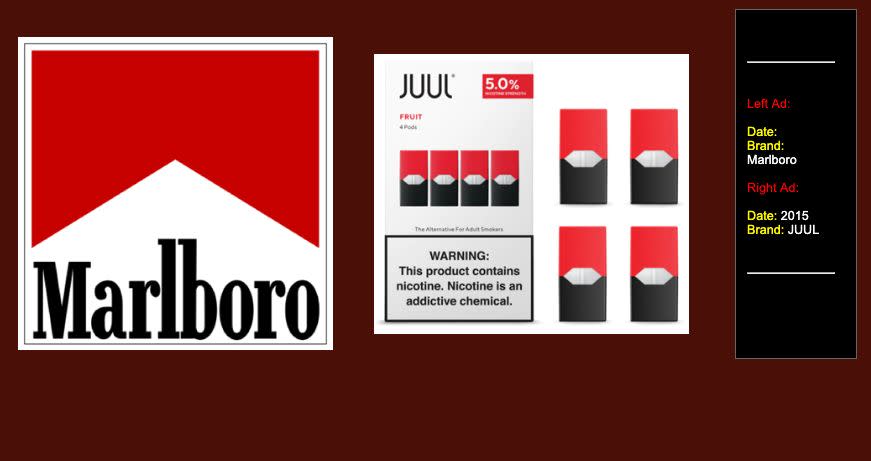
Dr. Jackler also brought up the example of the striking design similarities between Juul and Marlboro ads, which can be seen in the picture above.
“So you know, Marlboro is the number one youth initiation to combustible cigarette amongst American high school students,” said Dr. Sackler. “Juul of course, absolutely viral right amongst young people. And they've now come together,” he added, referring to Marlboro maker Altria’s stake.
“There are really serious implications for the fact that you could see a co-marketing,” said Dr. Jackler. “And that's got a lot of us very worried.”
Aarthi is a writer for Yahoo Finance. Follow her on Twitter @aarthiswami.
READ MORE:
E-cigs are twice as effective as nicotine replacement at helping smokers quit, study shows
Read the latest financial and business news from Yahoo Finance
Follow Yahoo Finance on Twitter, Facebook, Instagram, Flipboard, SmartNews, LinkedIn,YouTube, and reddit.
